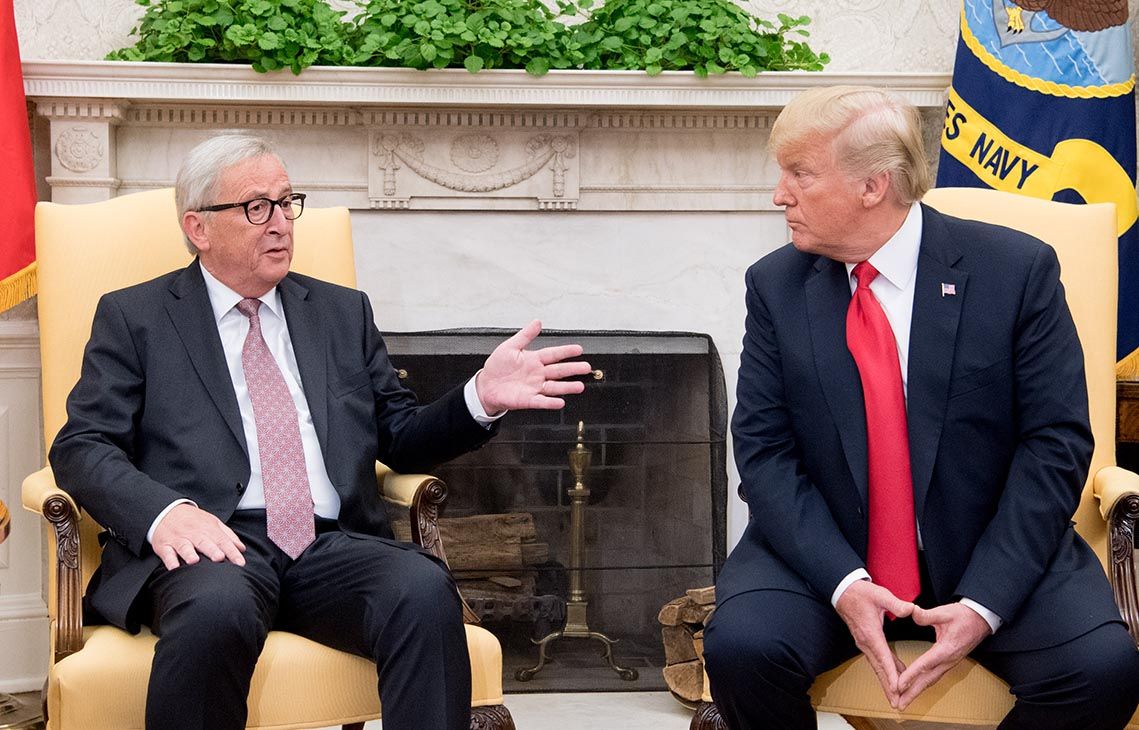Trump-Juncker Trade Agreement isn't Good for the US Dollar Rally

© European Union , 2018 / Source: EC - Audiovisual Service
- Scope of agreement between Trump and Juncker on trade "exceeds expectations"
- US Dollar tends to benefit when tensions are rising, not easing
- US and EU committ to slashing trade barriers to zero
The US and EU agreed to take steps towards freer bilateral trade between the two nations ensuring a potentially major stumbling block for the EUR/USD has been navigated.
A joint statement from US President Trump and EU Commission President Jean-Claude Juncker showed an agreement to pursue zero tariffs, zero non-tariff barriers, and zero subsidies on non-auto industrial goods. The sides will also work to reduce barriers and increase trade in services, chemicals, pharmaceuticals, medical products, as well as soybeans.
"The easing of transatlantic tensions supported the EUR, while the Bloomberg USD Spot Index traded lower as a result," says a note from the foreign exchange dealing desk at Barclays.
The market impact has been rather lacklustre, but then again, one is left wondering what the outcome would have been if both sides had not come to agreement. "For risky assets, averting an imminent global trade war was probably the best possible outcome that the Trump-Juncker showdown could deliver," says Viraj Patel, a foreign exchange analyst with ING Bank N.V.
Patel reminds us the US Dollar had been the big winner of the Trade War Trap that has been plaguing global markets in 2018 "so it’s not all too surprising to see the currency lower across the board on the back of easing global trade war risks."
ING say that in the absence of a notable escalation on market fears stemming from the trade war, the Dollar will likely struggle from here:
"This is merely the icing on the cake when it comes to our call that the USD rally has topped out; fading positive US data surprises, the markets’ extreme switch from short to long USD positions, the fizzling rally in short-term US rates and the President’s jawboning were already good enough reasons to see the USD rally briefly turn on its head."
Markets Surprised by Scale of Level-Headed Progress
"The Euro has continued to strengthen during the Asian trading session driven by an easing of trade tensions between the EU and US as well as a more broad-based reversal of recent US dollar strength. The outcome from yesterday’s meeting between EU Commission President Jean Claude Juncker and US President Trump on trading relations has exceeded expectations," says Lee Hardman, a currency analyst at MUFG.
Trump and Juncker were keen to emphasis the United States and the European Union have a $1 trillion bilateral trade relationship – the largest economic relationship in the world.
"We want to further strengthen this trade relationship to the benefit of all American and European citizens," read the statement.
In addition to working together towards achieving a zero tariffs, zero non-tariff barriers, and zero subsidies regime, the pair agreed to strengthen bilateral strategic cooperation with respect to energy.
The European Union wants to import more liquefied natural gas (LNG) from the United States to diversify its energy supply; this immediately triggers memories of Trump's recent extraordinary accusations that Germany is beholden to Russia because it relies so heavily on Russian energy imports.
Thirdly, Trump and Juncker agreed to launch a close dialogue on standards in order to ease trade, reduce bureaucratic obstacles, and slash costs. It was agreed to immediately form an Executive Working Group of advisors to carry this joint agenda forward.
"In addition, it will identify short-term measures to facilitate commercial exchanges and assess existing tariff measures. While we are working on this, we will not go against the spirit of this agreement, unless either party terminates the negotiations," adds the agreement.
Another outcome was an agreement to join forces to protect American and European companies better from unfair global trade practices, no doubt China will be the focus here.
The EU and US aim to "work closely together with like-minded partners to reform the WTO and to address unfair trading practices, including intellectual property theft, forced technology transfer, industrial subsidies, distortions created by state owned enterprises, and overcapacity."
US Lawmakers Boost Sentiment with Bill Aimed at Countering Trump's Trade War Agenda
The Juncker-Trump pact was not the only development out of the US that boosted market sentiment.
Senators Doug Jones and Lamar Alexander on Wednesday introduced a cross-party bill intended to delay the tariffs of 20% to 25% on imported cars and trucks being eyed by Trump.
The Automotive Jobs Act of 2018 would require the International Trade Commission (ITC) to conduct "a comprehensive study of the well-being, health, and vitality of the United States automotive industry before tariffs could be applied".
“These tariffs are a tax on American consumers and they’re going to cost Alabama jobs,” Jones said in a statement. “I share the President’s goal to reinvigorate manufacturing and secure trade deals that benefit our country, but not at the expense of one of Alabama’s biggest job creators."
"From the positive trade headlines, a general risk-positive climate also emerged, contributing to the cyclical currencies to outperforming within the G7 space," says Terence Wu with OCBC in Singapore. "A deal between Trump and Juncker headlined the positive trade developments. NAFTA optimism and US Senate action to delay auto tariffs also lifted sentiment."
Advertisement
Get up to 5% more foreign exchange by using a specialist provider to get closer to the real market rate and avoid the gaping spreads charged by your bank when providing currency. Learn more here




